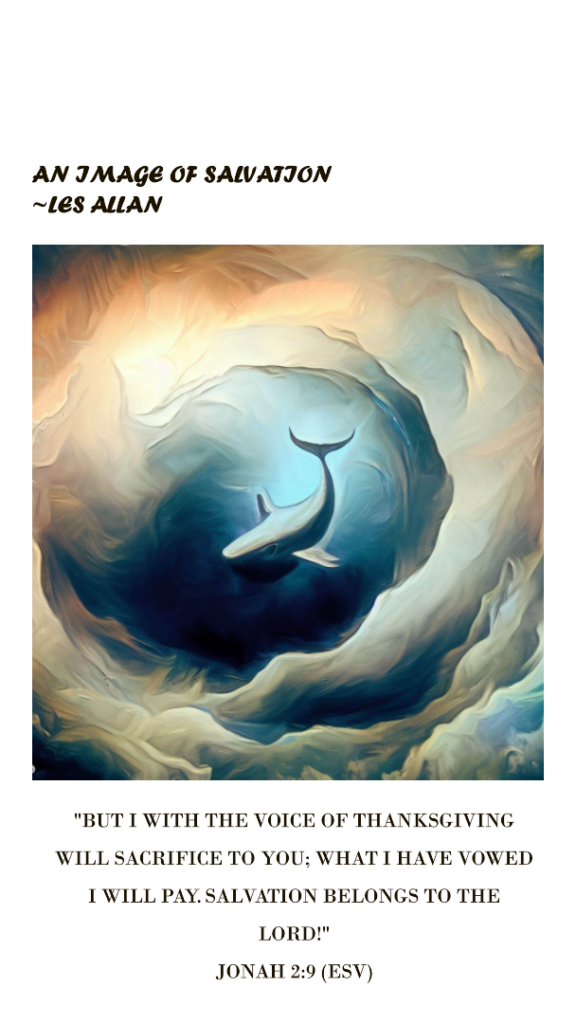Written By Lesallan – August 6, 2023

INITIAL OBSERVATIONS & QUESTIONS
• God appointed a great fish, and Jonah was swallowed in the fish’s belly for three days and three nights (Jonah 1:17, ESV).
o What does it mean that God appointed a great fish to swallow Jonah?
• Jonah prayed to God while he was in the belly of the fish (Jonah 2:1, ESV).
o How does Jonah’s prayer in Chapter Two compare with his actions in Chapter One?
• Jonah acknowledged that God had saved him from drowning (Jonah 2:6, ESV).
o What does this reveal about his attitude and relationship with God?
• Jonah expressed his gratitude to God for saving him (Jonah 2:9, ESV).
o How does this show God’s sovereignty and mercy?
• What are some of the themes and images that Jonah uses in his prayer?
• How do they relate to other parts of Scripture?
• How does Jonah’s experience with the fish foreshadow Jesus’ death and resurrection?
• How does this point to God’s plan of salvation?
• How do you respond when God calls you to do something you do not want to do? Do you obey or run away?
• Have you ever experienced God’s discipline or correction in your life? How did you react? Did you repent and seek His forgiveness?
• How can you praise God for His grace and deliverance in your life? What are some ways that you can express your gratitude and worship to Him?
• How can you share God’s message of salvation with others who do not know Him? What are some challenges or opportunities that you face in doing so?
STRUCTURE
Jonah 1:17-2:10 (ESV) is one section of the complete Book of Jonah (ESV) that tells the story of Jonah, a prophet whom God called to call out against the people of Nineveh (Jonah 1:1-2, ESV). Jonah initially refused to obey God’s command and fled from Him (Jonah 1:3, ESV). However, God sent a great storm that threatened the lives of everyone on board the ship that Jonah was on (Jonah 1:4, ESV). Jonah eventually confessed his disobedience to God and asked to be thrown into the sea (Jonah 1:12, ESV). God appointed a great fish to swallow Jonah and keep him safely in its stomach for three days and nights (Jonah 1:17, ESV). While in the belly of the fish, Jonah prayed to God and acknowledged His sovereignty (Jonah 2:1-9, ESV). The story of Jonah teaches us about God’s mercy and His willingness to forgive those who repent and turn back to Him (Jonah 2:10, ESV).
Jonah 1:17-2:10 (ESV) can be divided into two main sections: “A Great Fish Swallows Jonah” (1:17) and “Jonah’s Prayer” (2:1-10). In the first section, the Lord appointed a great fish to swallow Jonah, and he was in the belly of the fish for three days and three nights (Jonah 1:17, ESV). In the second section, Jonah prays to the Lord from inside the fish (Jonah 2:1, ESV). He acknowledges his distress and cries out to the Lord for help (Jonah 2:2, ESV). Jonah reflects on his situation, recognizing that he has been cast into the deep and surrounded by floodwaters (Jonah 2:3, ESV). Jonah expresses his hope that he will again see the Lord’s holy temple (Jonah 2:4, ESV). Jonah also acknowledges that those who worship idols forsake their hope of steadfast love (Jonah 2:8, ESV), but he will offer sacrifices to the Lord with thanksgiving (Jonah 2:9, ESV). Jonah 1:17-2:10 (ESV) concludes with the Lord speaking to the fish and causing it to vomit Jonah out onto dry land (Jonah 2:10, ESV). Jonah 1:17-2:10 (ESV) shows a clear progression from Jonah’s initial distress to his prayerful reflection and eventual deliverance by the Lord (Jonah 1:17-2:10, ESV).
I. A Great Fish swallows Jonah (Jonah 1:17, ESV).
A. The Lord appoints a great fish to swallow up Jonah (Jonah 1:17, ESV).
B. Jonah was in the belly of the fish for three days and three nights (Jonah 1:17, ESV).
II. Jonah’s Prayer (Jonah 2:1-10, ESV).
A. Jonah prays to the Lord from inside the fish (Jonah 2:1-10, ESV).
III. Jonah’s Distress (Jonah 2:2, ESV).
A. Jonah acknowledges his distress and cries out to the Lord for help (Jonah 2:2, ESV).
B. Jonah reflects on his situation, recognizing that he has been cast into the deep and surrounded by floodwaters (Jonah 2:3, ESV).
IV. Jonah’s Hope (Jonah 2:4-7, ESV).
A. Jonah expresses his hope that he will again see the Lord’s holy temple (Jonah 2:4, ESV).
B. He acknowledges that those who worship idols forsake their hope of steadfast love (Jonah 2:8, ESV).
C. He offers sacrifices to the Lord with thanksgiving (Jonah 2:9, ESV).
V. Jonah’s Deliverance (Jonah 2:10, ESV).
A. The Lord speaks to the fish and causes it to vomit Jonah out onto dry land (Jonah 2:10, ESV).
WORDS & PHRASES
“the Lord provided” (Jonah 1:17, ESV).
What did the Lord provide and why?
The answer to this question can be found in the passage’s context. Jonah 1:17 (ESV) says, “And the Lord appointed a great fish to swallow up Jonah. And Jonah was in the belly of the fish three days and three nights” (Jonah 1:17, ESV). From this passage, we can see that the Lord provided a great fish to swallow up Jonah. The reason for this provision is not explicitly stated in the text, but it can be inferred from the larger context of the book of Jonah that this was part of God’s plan to bring Jonah to repentance and fulfill His purposes.
“in my distress” (Jonah 2:2, ESV).
What was the cause of Jonah’s distress, and how did he respond to it?
Jonah 2:2 (ESV) says, “I called out to the Lord, out of my distress, and he answered me; out of the belly of Sheol I cried, and you heard my voice.” From this, we can see that Jonah was in a state of distress while he was in the belly of the fish. The cause of his distress is not explicitly stated in this verse, but it can be inferred from the larger context of the book of Jonah that he was feeling overwhelmed and helpless due to his situation.
“brought my life up from the pit” (Jonah 2:6, ESV).
What does Jonah mean by “the pit,” and how was his life brought up from it?
Jonah 2:6 (ESV) says, “at the roots of the mountains. I went down to the land whose bars closed upon me forever; yet you brought up my life from the pit, O Lord my God.” From this, we can see that Jonah is using the metaphor of “the pit” to describe his situation of being trapped in the belly of the fish.
What does the phrase “the pit” refer to in the Bible?
The phrase “the pit” often refers to a place of darkness, despair, and death in the Bible. In this case, Jonah is acknowledging that he was in a dire situation and that it was only through the intervention of God that he was able to be rescued. This shows that Jonah recognized his dependence on God and credited Him for his deliverance.
“Salvation” (Jonah 2:9, ESV).
What does the word “salvation,” which appears several times in the Book of Jonah 1:17-2:10 (ESV), highlight?
Jonah 2:9 (ESV) says, “But I with the voice of thanksgiving will sacrifice to you; what I have vowed I will pay. Salvation belongs to the Lord!” (Jonah 2:9, ESV). This phrase highlights the theme of salvation and deliverance throughout Jonah’s book.
What does the word “salvation” mean in Biblical Terms?
According to Strong’s Concordance (1890), the Hebrew word “yasha’” or its transliteration “yeshuah” mean “deliverance, health, helping, salvation, save, saving health, welfare. The feminine passive participle of yasha’; something saved, i.e. (abstractly) deliverance; hence, aid, victory, prosperity — deliverance, health, help(-ing), salvation, save, saving (health), welfare” (Strong Concordance, 1890). Further, the word “salvation” in Biblical terms refers to the act of being saved or delivered from danger, destruction, or sin. As per the Bible, God is known as the “Savior” and is considered the primary source of salvation. The concept of salvation is crucial for a Christian’s spiritual life, as it involves being saved from the consequences of sin, such as eternal death and mortality, and given the gift of eternal life.
SUMMARY, CORRELATION, & APPLICATION
A great fish swallows Jonah, he prays to God for deliverance, and is eventually vomited onto dry land (Jonah 1:17-2:10, ESV).
The main point of Jonah 1:17-2:10 (ESV) is that a great fish swallows Jonah; Jonah then prays to God for deliverance, and is eventually vomited onto dry land. This point arises from the passage through the biographical/poetic narrative structure and the overall progression of events. In Jonah 1:17 (ESV), it can be read that the Lord appointed a great fish to swallow up Jonah. This act of God sets the stage for the events that follow. In chapter two of the Book of Jonah (ESV), Jonah prays to God from inside the fish, acknowledging his distress and crying out for help. He reflects on his situation and expresses his hope in God’s deliverance. Finally, in Jonah 2:10 (ESV), the Lord speaks to the fish and causes it to vomit Jonah out onto dry land. This sequence of events shows how Jonah’s prayer and repentance led to his eventual rescue by God.
This passage from the Book of Jonah 1:17-2:10 (ESV) connects with other parts of Scripture through themes of God’s sovereignty, repentance, and deliverance. These passages showcase God’s power and control over nature, a theme found in other parts of Scripture, such as Job, where God speaks from the whirlwind and describes His control over the natural world (Job 38:1-41, ESV). Additionally, Jonah’s prayer from inside the fish demonstrates the theme of repentance and deliverance, which is also present in the Psalms (ESV), where the psalmist often cries out to God for help and acknowledges their dependence on Him for deliverance, “O LORD, my God, I cried to you for help, and you have healed me. O LORD, you brought up my soul from Sheol; you restored me to life from among those who go down to the pit” (Psalm 30:2-3, ESV). These passages serve as a reminder of God’s infinite power and love for His people.
The passage in Jonah 1:17-2:10 (ESV) can be applied to individuals, churches, and denominations through the theme of repentance and deliverance. Jonah turns to God in distress and trusts His power to deliver him, reminding me to do the same. The story of Jonah shows how God’s sovereignty is displayed through His control over the natural world. This story reminds me that nothing happens outside of His will. Overall, Jonah 1:17-2:10 (ESV) can be applied to my life, the lives of local church members, and the church as a whole by reminding us all to turn to God in times of distress and to trust in His sovereignty and control over all things.
FURTHER QUESTIONS
• What can we learn from Jonah’s experience about the nature of God and His relationship with His people?
• What lessons can we draw from this passage about repentance, faith, and obedience to God?
References:
STRONG’S CONCORDANCE. (1890). Www.kingjamesbibleonline.org. https://www.kingjamesbibleonline.org/strongs-concordance/



